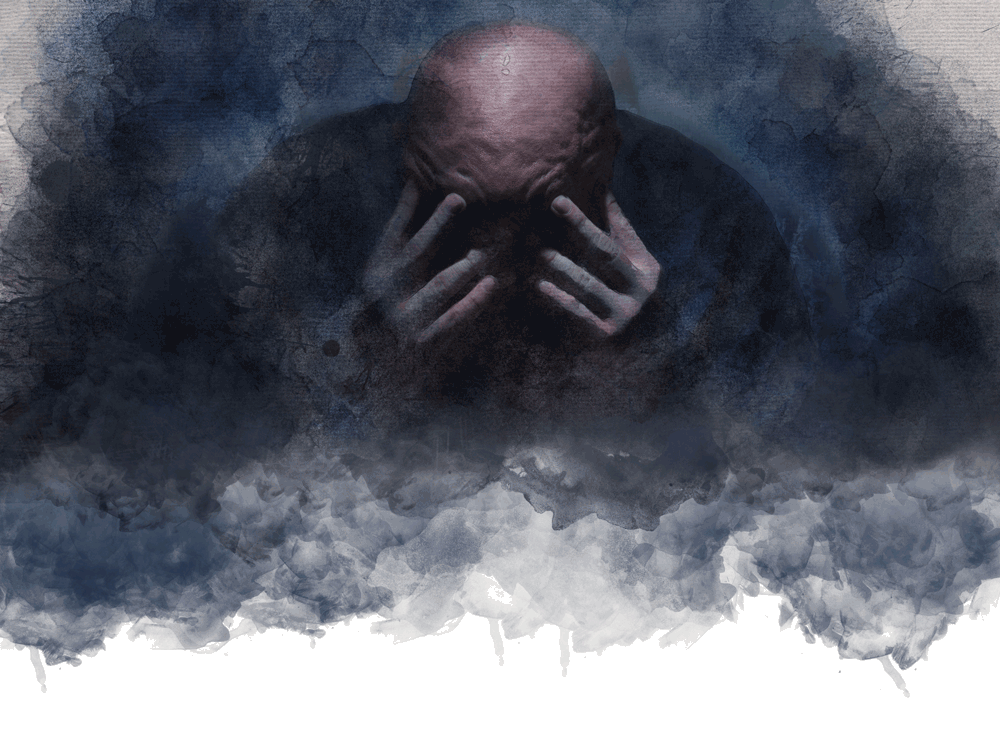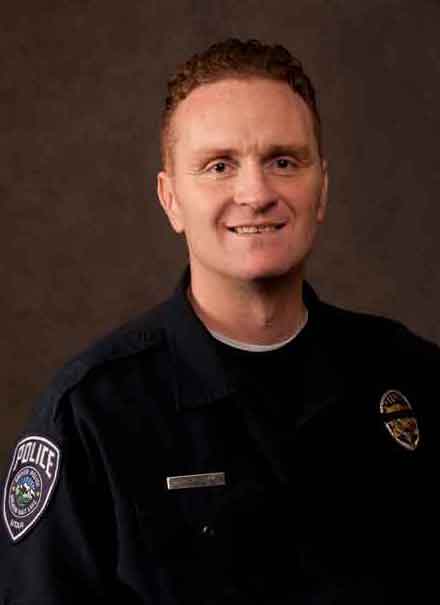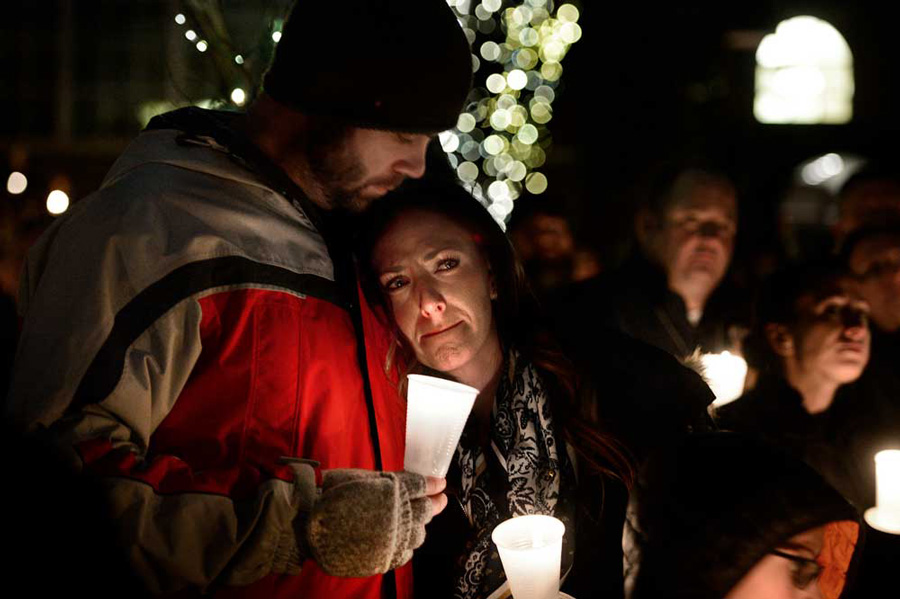 | OFFICER IN DISTRESS
| OFFICER IN DISTRESSScared, Detective Brent Jex finally sees a therapist. Now he tries to persuade officers to see past the stigma that nearly destroyed him.

West Jordan Detective Brent Jex arrived at the Jordan Winds business park early on Nov. 8 to scope out the identical beige stuccoed offices used by real estate agents and home health care firms. From the street, no one could tell a therapist worked there, but Jex still felt exposed. He backed his car into a spot at the far end of the lot.
A friend from the West Valley City Police Department coaxed him by phone, encouraging him to go into the office of therapist Brian Murdock. Jex walked about halfway and froze. He hurried back to the safety of his car and called his buddy. "I don't think I can do this," he said. Urged to try once more, Jex timed the gap between red lights on the adjacent street. He wanted to miss the rush of cars driving by, making it less likely he'd be seen. "You'd have thought I was breaking into Watergate."
On the second attempt, he made it through the front door.
Murdock stands over 6 feet tall and is solidly built. He speaks in a soft voice that is measured and confident. He keeps his hair short and has a goatee that at this point is mostly gray. His cozy office is designed to look like a living room, with a small desk in the corner, plush leather seats and a couch.

Therapist Brian Murdock saw Officer Brent Jex and now works with Utah's Fraternal Order of Police to provide up to two free visits for police officers.
Photo by Scott Sommerdorf | The Salt Lake Tribune
Jex expected touchy-feely. Instead, "I just found myself having a conversation." So sleep deprived he thought he was going crazy, Jex wanted Murdock to write him a prescription. Murdock declined, saying the detective's body needed to come up with its own answer. He also warned that going through therapy, facing down each tragedy that weighed on him, would likely make everything worse before it got better.
The possibility that things could get worse had never occurred to Jex.
Murdock spent their first visit explaining the therapy he thought would be the most effective to treat Jex's panic attacks, inability to sleep, uneasiness in crowds and hypervigilance. It's called eye-movement desensitization and reprocessing, or EMDR for short. Jex would think intensely about a traumatic event while grasping small plastic paddles that would vibrate — alternating stimulation intended to help him "reprocess" the event. By splitting the brain's attention between the memory and the vibrating paddles, the therapy is thought to reduce the power of the troubling memory.
Reprocessing, Murdock explained, helps put the memory "in the healthy part of the brain so it is no longer a trigger, no longer frozen in time, where it can come back on you." Many psychologists thought EMDR was a gimmick when Francine Shapiro developed it in 1987, but it has since become an accepted tool for working with rape victims, combat veterans and others.
A person stores intense memories in four ways, Murdock explained: through images, thoughts, emotions and body sensations. During therapy, Murdock wheels his chair close to his patients, often just inches away. He asks them to think of an image tied to the traumatic event. Next, he asks patients to identify any negative thoughts about themselves and recall what they felt in that moment, anything from a pit in their stomach to goosebumps.
He then asks that they let their minds wander as he turns buttons on a white plastic box, controlling the intensity and longevity of the vibrations in the paddles they're holding. Therapist and patient sit quietly for about 30 seconds. Murdock turns off the device, encourages his patients to take a deep breath and asks if any thoughts bubbled to the surface.
Murdock repeats this cycle until they say the traumatic memory no longer holds so much emotional power over them, rating it on a scale of zero to 10. Getting to a zero, which is neutral, can happen quickly, or it can take many cycles over many visits. Jex's reaction to learning about EMDR therapy was: "No way, but I'll humor you." He was burned out and desperate. Murdock asked him to name his first big trauma and the worst trauma he experienced. The answer to both questions was Ron Wood's murder, which is where they began the following week.
When Murdock prompted Jex to think of an image, he recalled bumping into Wood at the police station, shortly after Justin Van Roekel ran away at the high school. Jex told him he was looking for "some problem children." It was the last time he'd see Wood alive. Murdock asked him what he felt, and the first word that popped into his head was "failure." Next were body sensations: being consumed by the cloud of anxiety. Jex thought, "I hope this works, because I'm sick of this."
The paddles buzzed.
In the second round, he saw Wood's casket at his graveside service, with the medical helicopters overhead and dispatch performing the ceremonial last call. His anxiety subsided a touch. He was surprised his thoughts weren't always logical or linear, and Murdock encouraged him to let his brain unwrap the case any way it wanted to.
After a few reprocessing rounds, they talked. Murdock, playing devil's advocate, wanted Jex to explain how he botched the case. Jex described the robberies and the police stop in September of that year, when Justin, Tyler Atwood and Sean Tims got caught with guns but juvenile detention wouldn't lock them up.
"So you had enough to book him on the robberies?"
Jex fell silent.
What did they really have on Justin? Not much. They didn't directly tie him to the robberies until after the shooting. Maybe Jex could have tried to book him on something related to his violent statements to teacher Jana White, but Jex had secondhand knowledge of the comments, and everyone at the school was encouraging counseling.
Sitting in Murdock's office, with the therapist leaning well into his personal space, Jex saw the case from a different perspective. He realized his guilt had weighed on him for so long that the details had become largely irrelevant. He wished he had responded differently, but there was no egregious errors. It was revelatory. His self-loathing didn't magically evaporate, but his guilt eased. In its place came annoyance.
"I felt stupid for how it influenced me," he said. "All the things I didn't realize before because I was clutching onto it too tight and not in the right frame of mind." After that visit, Jex was a believer in EMDR. In two more hourlong sessions, he grappled with his actions, his concern for Wood's widow, and his anger — at himself and at the other detectives there when Justin ran away. In between those sessions, the department recognized the anniversary of Wood's death and Jex, for the first time, was able to talk about his fallen colleague without breaking down.
In his first discussion with Murdock, Jex had said Wood's death was at least an eight on the 10-point trauma scale. By the end of his third appointment, it hit zero. His thoughts shifted to Draper Sgt. Derek Johnson. One trauma rolled right into the next.
How had Jex not recognized Johnson as paramedics performed CPR on the side of the road? Or at the hospital, moments before Johnson died? What did it say about his mental state? Murdock had plausible answers. "In traumatic situations, our brain can shut down to try to deal," he explained. "But, in his mind, it meant he wasn't a good friend because he didn't recognize him."
Jex started to get some real sleep, sometimes as much as seven hours a night, making him feel more like himself.
The paddles kept buzzing as Jex worked through the suicides of Mike Valdes and a co-worker in West Jordan who intentionally drove off a cliff. He talked about trying to save the baby girl by performing CPR. By January, he was amazed at how well the therapy had worked. He still felt sadness and pain, but the panic attacks stopped, as did the nightmares. He was making steady progress with no major relapses.
"There was definitely a clearing," he said. "We powered through the worst of it."
IN THIS VIDEO: Brian Murdock simulates a reprocessing therapy session, talking into the camera, as if you are the patient.
Jex's back is never to a door or a window, and he scopes out all entryways. That's pretty common for a cop. Even at church, he'd pick a pew that had good sightlines. While he was supposed to be listening to speakers at a Mormon worship service, he would run through how he'd react if an armed intruder burst in and started firing. When he would come up with an acceptable scenario, he'd run through alternatives. What if there were two shooters? "I would game-plan it out," he said, "and that was normal to me."
There's a difference between healthy preparedness and what Jex was repeatedly doing. Murdock told Jex the trauma experienced by soldiers and cops has similarities. Soldiers tend to witness more extreme trauma, then leave the battlefield behind, at least physically.
"You guys work in your horrific zone, and your family lives in those horrific zones and your children go to school in your horrific zone," Murdock told Jex. "It's just destructive."

“
You guys work in your horrific zone, and your family lives in those horrific zones and your children go to school in your horrific zone."
Brian Murdock to Detective Brent Jex
It makes sense that police officers can start to see everyone in the cities in which they serve as threats. With this in mind, Murdock asked Jex: "When was the last time you left your house without your gun?"
"Why would I leave my house without my gun?" Jex asked with some alarm.
"So that you would know that you could."
Jex argued that if he left his house without his reliable Glock 43, then that would be the day of a theater shooting or a convenience store robbery.
"Constantly having his gun was kind of a representation of always having to be on guard," Murdock said, looking back on the conversation. It reflects the mindset: "'I have the responsibility to defend because I have the means to defend.' But sometimes he needs to just be a guy."
Being hypervigilant is counterproductive, Murdock said, because it leaves an officer like Jex drained and raw, meaning he might react poorly in a crisis. Jex believes this is the most important thing he learned during his months in therapy.
"You want to see the person coming through the door with the gun so you can react before anything happens, and it's dangerous, because then you're constantly on edge and hypervigilant and that translates into lack of sleep, and lack of sleep turns into anxiety; anxiety turns into misreading situations," Jex said. "It was seriously the most eye-opening thing that I've gone through in 17 years."
He agreed to start small. He left the house without his phone and survived. Then, he got up the courage to place his Glock in the gun safe and his phone on his nightstand and push a cart around a grocery store. He felt uncomfortable, but nothing happened. He's done it since, not often, but enough to know he doesn't need to be armed at all times.
By March 2015, after 14 sessions, Jex felt centered. Murdock told him he should check back in if he started to feel stressed. As he went through the sessions, Jex also talked to Murdock about his marriage. He realized he had shut Katie out of a major portion of his life. He did so thinking he was protecting her; instead, he left himself without someone to confide in when he needed that the most.
"I had hit bottom, and it was like I'm drowning and I knew communication was a life vest," he said. "She had a lot of patience with me."
Jex even asked Katie to meet with him and Murdock for a session, during which they talked about his progress and potential warning signs. They started talking more and going out to lunch together, and occasionally caught a movie — normal relationship stuff they had set aside too long as they focused on their jobs and their children.
"I thought our marriage was great before this started," she said. "But it was just amazing to watch how this whole thing pulled us together."
Ten months later, another "officer down" call would put Jex's progress to the test.
Officer Doug Barney approached a man running from a car crash. Without warning, 31-year-old fugitive Cory Lee Henderson turned around and shot Barney in the head.

Officer Doug Barney
Courtesy photo
Fellow cops with the Unified Police Department in Salt Lake County converged and killed Henderson in a barrage of more than 20 bullets. But before he died, Henderson returned fire, striking Officer Jon Richey in the leg and torso. Those injuries weren't life-threatening.
When Katie Jex heard about the shooting, she wondered if it would trigger an emotional relapse in her husband, who had known Barney for years. Would he withdraw again, become moody, fall back into hopelessness? Jex also wasn't sure how he'd react.
"I was actually really nervous about going to the hospital," he said.
Doctors placed Barney on life support, giving the family a chance to gather for a final goodbye. Jex paid his respects to Barney's wife and family, then he visited with the police officers who lined the hallways. He made sure to find Lt. Lex Bell, an exceptionally close friend of Barney's who also served as the news media's main point of contact on his shooting. Jex counseled the lieutenant to take time to grieve. And he asked Bell to keep an eye on the other officers who were at the scene, particularly Richey, to make sure none of them blamed themselves. (Richey recovered from his injuries but suffered a fatal heart attack in February 2017.)

Shante Johnson, widow of Draper Sgt. Derek R. Johnson, at the vigil held in Holladay for slain Officer Doug Barney.
Photo by Scott Sommerdorf | The Salt Lake Tribune
While crushed at the loss of Barney, Jex managed his emotions. Still, that day and in the days to come, he kept returning to an idea he'd begun to form while in therapy.
Protecting the public comes at a personal cost. The longer officers stay on the job, the more likely they are to construct emotional armor to protect themselves from the awful things they see. This leaves cops feeling a step removed from the people they are supposed to serve, their neighbors and even their own families. As a result, they find solace only when surrounded by colleagues; who else can understand what they're going through? And yet, to let those trusted fellow officers know they are struggling, to acknowledge they feel disconnected or have a loss of empathy or even a loss of control, that would be like conceding that they don't belong.
This is the mentality Jex believes drives officers to hide their pain; this is why he knows of so many cops over the years who abuse drugs or alcohol, have emotional problems or have died by suicide. This is what drove him to the edge, and now he felt compelled to combat it. But how?
Michael Brown in Ferguson, Mo., in 2014.
Walter Scott in North Charleston, S.C., in 2015.
Philando Castile in St. Anthony, Minn., in 2016.
Stephon Clark in Sacramento in 2018.
The deaths of these men and scores of others in police shootings have driven a nationwide debate over the militarization of law enforcement and racism within the ranks.
That conversation infuriates Jex, who is, above all else, a defender of his profession. He finds it almost intolerable that so many see cops as the problem. He feels the criticism is often unjust and amplifies the us-vs.-them mentality with which some officers already struggle. He says it leaves them thinking: Who are these politicians and journalists? Who are these protesters? They have never had to make life-or-death decisions in a flash. They don't know what it is really like out there. But his post in the Fraternal Order of Police and his experience in therapy also give him a different perspective. He knows all too well that stress can warp reality. One traumatic experience after another can lead to poor decision-making. Jex believes police departments must devote more attention to mental health. If they do, there may be fewer questionable shootings.
"I'm 100 percent convinced that if we did a better job as a society, and especially as a profession of helping cops get through these things, we wouldn't see the things we see," he said, adding alcohol and prescription-drug abuse and domestic violence to debatable times when officers fire their weapons. "We want guys out there with a clear mind and not having a reaction or a flashback to something and reacting in the wrong way. It would be very naive to think that doesn't happen, and I think there are some uses of force that are tied directly back to responses like that."
But how do you persuade police to seek help? The long-stalled FOP mental health program was a start.
At a state convention, Jex told FOP lodge presidents, representing 2,700 Utah officers, about his experience in therapy and how the plan would work. They supported him unanimously, funding his plan to cover the first two therapy sessions for officers. Murdock is one available therapist; they found another with offices in southern Utah. Both promised anonymity. In its first year, 10 officers took advantage of the program. A dozen more received help the next year, and Jex continues to promote the free therapy.
He didn't stop there.
Weeks after Doug Barney's death, Jex went to the state Capitol to talk privately with Utah Gov. Gary Herbert and criminal justice officials. He started by describing his panic attacks after giving the dying baby girl CPR and his reluctance to seek therapy, fearing it would end his career. The room remained quiet. "It was one of the most compelling things I've ever seen," said Kelly Atkinson, a former FOP lobbyist. "It moved me to tears. I couldn't believe his honesty."
Jex urged the state to study post-traumatic stress in cops and create a training course with the goal of educating officers about the psychological effects of the job. When he finished, the governor turned to Ron Gordon, who then led the Commission on Criminal and Juvenile Justice, and said: "Ron, we need to do something about this. We need to make something happen." Gordon had worked for the commission for 20 years, and this was the first time he was asked to address the mental impact of policing. He invited Jex to speak to his group, which was made up of judges, prosecutors, police chiefs and victim advocates. They explored creating a new police academy course, which is still in the works. Eventually, the commission gave Jex and the FOP a $20,000 grant.
He used the money to build a makeshift TV studio in the FOP's spartan basement offices. Over a few months, fellow officers ran the camera and served as sound technicians while Jex interviewed people in and around law enforcement about stress and trauma. In one, widow Shante Johnson, fighting tears, says: "It is really hard to watch somebody struggle. ... I feel like, as cops, you guys internalize so much and you try to hide so much from your spouses and your children." Jex plans to post the videos on DunamisPolice.org, a website he and his team created that takes its name from the Greek word for strength.
He was also heartened to see the 2018 Utah Legislature pass a bill granting anonymity to officers and members of peer-support teams, unless in their conversations officers are a clear danger to themselves or others, or confess to a crime. Many cops have worried that peer-support officers could be compelled to testify in court, including in divorce cases. This law, which Jex aggressively pushed in past years, would help additional responders, such as firefighters. As Jex's career nears its end — he is considering retirement in early 2019 — he wants to leave behind a Utah law enforcement community that is better prepared to care for itself.
After Ron Wood was killed in 2002, Jex desperately wanted Tyler Atwood to serve his time in prison and then some for Justin Van Roekel, at least enough so that by the day he walked free, Denise Vincent, Richard Davis, Richard Schaffnit and anyone else who was close to Wood had retired. Jex considered that justice. Despite a supportive prosecutor and judge, that's not what happened.
Atwood got paroled from the state prison in May 2008 and transferred immediately to a federal lockup in Texas, where he served four more years on federal gun charges. He became a free man Nov. 23, 2012, after spending 9½ years incarcerated, roughly a third of what Jex originally envisioned.
Jex didn't even know Atwood had been released until a reporter brought it to his attention. He bristled initially, took a moment and then shrugged it off.
Nearly 10 years is a pretty long sentence for a 17-year-old convicted of two armed robberies. And so far, Atwood has had no other run-ins with the law.
"Reality and reason have set back in," Jex says. "I'm confident that I could deal with him today and not have any residual ... anything."
Unlike Wood's family, Jex can't forgive Atwood for his role in the crime spree or Van Roekel for pulling the trigger. But he feels he's reconnected to his own humanity and to the reason he became an officer: to protect both the public and his fellow cops. He knows he can't stop an officer from being ambushed or end the national debate over police shootings. But by sharing his story, and by striving to make it feel less risky to reach out, he hopes to guide more officers to get help.
And in the end, that is all the justice he needs.
Mental health resources
Learn about the Utah Fraternal Order of Police Mental Health Program.
See DunamisPolice.org's page about trauma and mental health.
Find help for anyone experiencing suicidal thoughts at 1-800-273-TALK (8255). Utah also has crisis lines statewide.
The SafeUT app offers immediate crisis intervention services for youths and a confidential tip program.






